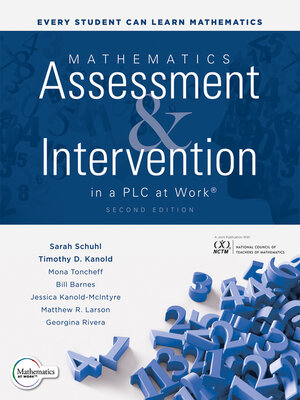Mathematics Assessment and Intervention in a PLC at Work®
ebook ∣ (Develop research-based mathematics assessment and RTI model (MTSS) interventions in your PLC)
By Sarah Schuhl

Sign up to save your library
With an OverDrive account, you can save your favorite libraries for at-a-glance information about availability. Find out more about OverDrive accounts.
Find this title in Libby, the library reading app by OverDrive.



Search for a digital library with this title
Title found at these libraries:
| Library Name | Distance |
|---|---|
| Loading... |
This second edition book from the Every Student Can Learn Mathematics series guides you and your collaborative teams in building student and collective teacher efficacy through the formative use of common assessments. Discover how you can work interdependently to design high-quality assessments, calibrate scoring of student work, and analyze data to enhance instructional practices and sustain effective Tier 2 learning experiences for students. New and enhanced protocols and examples provide practical tools and models for immediate implementation.
Improve your mathematics collaborative team assessment processes using the four critical questions of a PLC at Work® along with an RTI or MTSS focus on effective Tier 2 interventions.
This book will help K–12 mathematics teachers and teacher teams:
Contents:
Preface
Introduction
Chapter 1: The Mathematics at Work Common Assessment Process
Chapter 2: Quality Common Mathematics Assessments
Chapter 3: Sample Common Mathematics Assessments and Calibration Routines
Chapter 4: Teacher Actions in the Formative Assessment Process
Chapter 5: Student Actions in the Formative Assessment Process
Chapter 6: Team Response to Student Learning Using Tier 2 Mathematics Intervention Criteria
Summary
Epilogue
Appendix
References and Resources
Index







